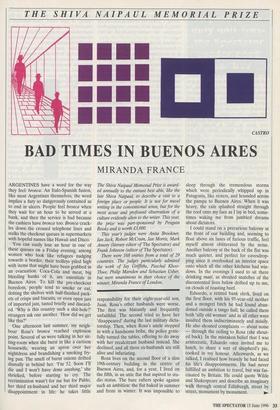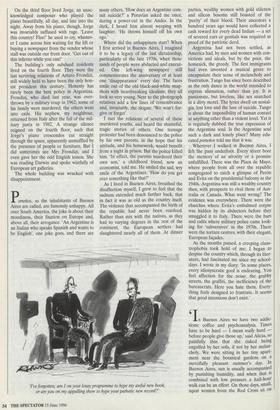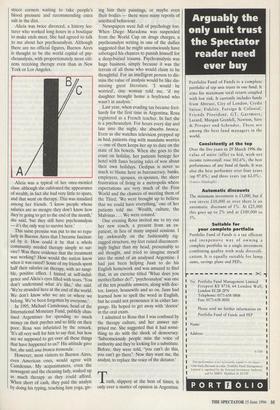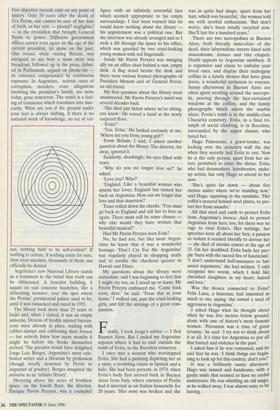THE SHIVA NAIPAUL MEMORIAL PRIZE
BAD TIMES IN BUENOS AIRES
MIRANDA FRANCE
ARGENTINES have a word for the way they feel: bronca. An Italo-Spanish fusion, like most Argentines themselves, the word implies a fury so dangerously contained as to end in ulcers. People feel bronca when they wait for an hour to be served at a bank, and then the service is bad because the cashiers have bronca too. Branca crack- les down, the crossed telephone lines and stalks the checkout queues in supermarkets with hopeful names like Hawaii and Disco.
You can easily lose an hour in one of these queues on a Friday evening, among women who look like refugees nudging towards a border, their trolleys piled high with items that might have been grabbed in an evacuation. Coca-Cola and meat, big bleeding hunks of it, are essentials in Buenos Aires. To, kill the pre-checkout boredom, people tend to smoke or eat, dotting the shelves with half-finished pack- ets of crisps and biscuits, or even open jars of imported jam, tasted briefly and discard- ed. 'Why is this country such a shit-hole?' strangers ask one another. 'How did we get like this?'
One afternoon last summer, my neigh- bour Rosa's bronca reached explosion point. Several of us, were talking in her sit- ting-room when she burst in like a cartoon housewife, wearing an apron over her nightdress and brandishing a smoking fry- ing pan. The smell of burnt onions drifted dismally in behind her. 'I'm 52. Soon I'll die and I won't have done anything,' she shrieked, before starting to cry. The recrimination wasn't for me but for Pablo, her third ex-husband and her third major disappointment in life: he takes little The Shiva Naipaul Memorial Prize is award- ed annually to the entrant best able, like the late Shiva Naipaul, to describe a visit to a foreign place or people. It is not for travel writing in the conventional sense, but for the most acute and profound observation of a culture evidently alien to the writer. This year, the prize was part-sponsored by Penguin Books and is worth L3,000.
This year's judges were Anita Brookner, Ian Jack, Robert McCrum, Jan Morris, Mark Amory (literary editor of The Spectator) and Frank Johnson (editor of The Spectator).
There were 168 entries from a total of 29 countries. The judges particularly admired the work of Jay Griffiths, Paschal Khoo- Thwe, Philip Marsden and Sebastian Usher, but were unanimous in their choice of the winner, Miranda France of London.
responsibility for their eight-year-old son, Juan. Rosa's other husbands were worse. The first was blatantly and frequently unfaithful. The second tried to have her `disappeared' during the last military dicta- torship. Then, when Rosa's uncle stepped in with a handsome bribe, the police grate- fully turned the tables, offering to do away with her recalcitrant husband instead. She declined, and all three ex-husbands are still alive and infuriating.
Rosa lives on the second floor of a slim 19th-century building in the centre of Buenos Aires, and, for a year, I lived on the fifth, in an attic flat that aspired to stu- dio status. The bare rafters spoke against such an ambition: the flat baked in summer and froze in winter. It was impossible to sleep through the tremendous storms which were periodically whipped up in Patagonia, like rioters, and hounded across the pampa to Buenos Aires. When it was heavy, the rain splashed straight through the roof onto my face as I lay in bed, some- times waking me from jumbled dreams about dictators.
I could stand on a precarious balcony at the front of our building and, seeming to float above six lanes of furious traffic, feel myself almost obliterated by the noise. Another balcony at the back of the flat was much quieter, and perfect for eavesdrop- ping since it overlooked an interior space onto which all the other kitchens had win- dows. In the evenings I used to sit there drinking mate, as shouted snatches of the discontented lives below drifted up to me, on clouds of roasting beef.
Eduardo, a retired bank clerk, lived on the first floor, with his 95-year-old mother and a mongrel bitch he had found aban- doned outside a tango hall; he called them both 'silly old woman' and in all other ways insulted them indiscriminately and noisily. He also shouted complaints — about noise — through the ceiling to Rosa (she shout- ed back). In the mistaken belief that I was aristocratic, Eduardo once invited me to lunch, to share a sort of shepherd's pie, cooked in my honour. Afterwards, as we talked, I realised how bravely he had faced his life's disappointments. He had never fulfilled an ambition to travel, but was fas- cinated by Britain. He could quote Wilde and Shakespeare and describe an imaginary walk through central Edinburgh, street by street, monument by monument. On the third floor lived Jorge, an unac- knowledged composer who played the piano beautifully, all day, and late into the night. Away from his piano, though, Jorge was invariably suffused with rage. `Leave this country! Flee!' he used to cry, whenev- er I came across him waiting for the lift or buying a newspaper from the vendor whose stall was outside our front door. `Get out of this inferno while you can!'
The building's only subdued residents lived on the fourth floor. They were the last surviving relations of Arturo Frondizi, still widely held to have been the only hon- est president this century. Honesty has rarely been the best policy in Argentina. Frondizi, who died last year, was over- thrown by a military coup in 1962; some of his family were murdered, the others went into exile. His nephew, my neighbour, returned from Italy after the fall of the mil- itary junta in 1982. A strange silence reigned on the fourth floor, such that Jorge's piano crescendos cut straight through the space, apparently unmuffled by the presence of people or furniture. But I did sometimes see Mrs Frondizi, and I even gave her the odd English lesson. She was reading Darwin and spoke wistfully of European art galleries.
The whole building was wracked with disappointment.
Porterios, as the inhabitants of Buenos Aires are called, are famously unhappy. All over South America, the joke is about their moodiness, their fixation on Europe and, above all, their arrogance. `An Argentine is an Italian who speaks Spanish and wants to be English', one joke goes, and there are many others. `How does an Argentine com- mit suicide?' a Peruvian asked me once, during a power-cut in the Andes. In the dark, I heard him almost weeping with laughter. 'He throws himself off his own ego.'
Where did the unhappiness start? When I first arrived in Buenos Aires, I imagined it to be a legacy of the last dictatorship, particularly of the late 1970s, when thou- sands of people were abducted and execut- ed. One left-wing newspaper still commemorates the anniversary of at least one 'disappearance' every day. The faces smile out of the old black-and-white snap- shots with heartbreaking idealism; they all look so very young. Next to the photograph relatives add a few lines of remembrance and, invariably, the slogan: `We won't for- give or forget'.
I met the relations of several of these murdered youths, and heard the shameful, tragic stories of others. One teenage protester had been denounced to the police by his own parents, in the hope that his attitude, and his homework, would benefit from a night in prison. But the police killed him. 'In effect, the parents murdered their own son,' a childhood friend, now an economist, told me. He smiled the sad, wry smile of the Argentines. 'How do you get over something like that?'
As I lived in Buenos Aires, breathed the disaffection myself, I grew to feel that the sadness extended much further back, that in fact it was as old as the country itself. The violence that accompanied the birth of the republic had never been resolved. Rather than mix with the natives, as they had to varying degrees in the rest of the continent, the European settlers had slaughtered nearly all of them. At dinner I've forgotten; am I on your lousy programme to hype my awful new book, or are you on my appalling show to hype your pathetic new record?' parties, wealthy women with gold stilettos and silicon bosoms still boasted of the `purity' of their blood. Their ancestors a hundred years ago would have collected a cash reward for every dead Indian — a set of severed ears or genitals was required as proof of the patriotic deed.
Argentina had not been settled, as America had, by men and women with con- victions and ideals, but by the poor, the homesick, the greedy. The first immigrants had even invented a musical genre to encapsulate their sense of melancholy and frustration. Tango has since been described as the only dance in the world intended to express alienation, rather than joy. It is passionate, but loveless, like sex snatched in a dirty motel. The lyrics dwell on nostal- gia, lost love and the lure of suicide. Tango is about the impossibility of human contact at anything other than a violent level. Yet it is regularly dubbed the true expression of the Argentine soul. Is the Argentine soul such a dark and lonely place? Many edu- cated portenos told me that it was.
Wherever I walked in Buenos Aires, I felt the pain underfoot. Every street bore the memory of an atrocity or a promise unfulfilled. There was the Plaza de Mayo, where people from all over the republic congregated to catch a glimpse of Peron and Evita on the presidential balcony in the 1940s. Argentina was still a wealthy country then, with prospects to rival those of Aus- tralia or Canada. What went wrong? The evidence was everywhere. There were the churches where Evita's embalmed corpse was hidden by its abductors before they smuggled it to Italy. There were the bars and cafés where military police came look- ing for 'subversives' in the 1970s. There were the torture centres, with their elegant, European façades.
As the months passed, a creeping claus- trophobia took hold of me; I began to despise the country which, through its liter- ature, had fascinated me since my school- days. I wrote in my diary: 'In some places, every idiosyncratic goof is endearing. You feel affection for the noise, the grubby streets, the graffiti, the inefficiency of the bureaucrats. Here you hate them. Every- thing feels designed to frustrate. It seems that good intentions don't exist.'
In Buenos Aires we have two addic- tions: coffee and psychoanalysis. Times have to be hard — I mean really hard before people give those up,' said Alicia, so painfully thin that she risked being engulfed by her sofa, if not by her melan- choly. We were sitting in her tiny apart- ment near the botanical gardens on a mercifully pleasant summer's day. In Buenos Aires, sun is usually accompanied by punishing humidity, and when that is combined with low pressure a half-hour walk can be an effort. On those days, small, squat women from the Red Cross sit on street corners waiting to take people's blood pressure and recommending extra salt in the diet.
Alicia was twice divorced, a history lec- turer who worked long hours in a boutique to make ends meet. She had agreed to talk to me about her psychoanalysis. Although there are no official figures, Buenos Aires is thought to be the world capital of psy- choanalysis, with proportionately more citi- zens receiving therapy even than in New York or Los Angeles.
Alicia was a typical of her once-monied class: although she cultivated the appearance of wealth, in fact she had very little to spare, and that went on therapy. This was standard among her friends. 'I know people whose salaries are so meagre they don't know how they're going to get to the end of the month,' she said, tut they still have psychoanalysis — it's the, only way to survive here.' This same premise was put to me so regu- larly in Buenos Aires that I became fascinat- ed by it. How could it be that a whole community needed therapy simply to sur- vive? Was there evidence that the treatment was working? How would the nation know when it was cured? Some of my friends spent half their salaries on therapy, with no tangi- ble, positive effect. I hinted at self-indul- gence and Alicia's eyes filled with tears. 'You don't understand what it's like,' she said. `We're stranded here at the end of the world. We don't know who we are or where we belong. We've been forgotten by everyone.'
In 1995, Michael Camdessus, head of the International Monetary Fund, publicly chas- tised Argentines for spending so much money on their psyches and so little on their poor. Rosa was infuriated by the remark. `It's all very well for him to say that, but how are we supposed to get over all these things that have happened to us?' His attitude gave her, she said, una bronca tremenda.
However, most visitors to Buenos Aires, even American ones, would agree with Camdessus. My acquaintances, even the newsagent and the cleaning lady, soaked up as much therapy as they could afford. When short of cash, they paid the analyst by doing his typing, teaching him yoga, giv- ing him their paintings, or maybe even their bodies — there were many reports of unethical behaviour.
Newspapers were full of psychology too. When Diego Maradona was suspended from the World Cup on drugs charges, a psychoanalyst writing in one of the dailies suggested that he might unconsciously have sabotaged his chances to punish himself for a deep-buried trauma. Psychoanalysis was huge business, simply because it was the terrain of all those who would claim to be thoughtful. For an intelligent person to dis- miss the value of analysis would be like dis- missing great literature. 'I would be worried', one woman told me, 'if my daughter brought home a boyfriend who wasn't in analysis.'
Last year, when evading tax became fool- hardy for the first time in Argentina, Rosa registered as a French teacher. In fact she is a psychoanalyst. For hours every day and late into the night, she absorbs bronca. Even as she watches television propped up in bed, patients ring with mundane worries — one of them keeps her up to date on the state of his bowels. When she goes to the coast on holiday, her patients besiege her hotel with faxes bearing tales of woe about their own holidays. Oedipus is never so much to blame here as bureaucracy, banks, employers, spouses, ex-spouses, the sheer frustration of living in a metropolis where expectations are very much of the First World and the chances of meeting them of the Third. 'We were brought up to believe that we could have everything,' one of her patients told me. 'Wealth, culture, the Malvinas . . . We were conned.'
One evening Rosa invited me to try out her new couch, a present from an ex- patient, in lieu of many unpaid sessions. I lay awkwardly on the fashionably zig- zagged structure, my feet raised disconcert- ingly higher than my head, presumably to aid thought, and tried to imagine myself into the mind of an analysed Argentine. I had just been helping Juan to do his English homework and was amazed to find that, in an exercise titled 'What does you mother/father do?', 'psychoanalyst' was one of the ten possible answers, along with doc- tor, lawyer, housewife and so on. Juan had learned how to spell the word in English, but he could not pronounce it in either lan- guage. He hoped to get away with 'doctor' in the oral exam.
I admitted to Rosa that I was confused by the therapy culture, and her answer sur- prised me. She suggested that it had some- thing to do with the shock of democracy. `Subconsciously people miss the voice of authority and they're looking for a substitute. Before, they were told, "you can't do this, you can't go there". Now they want me, the analyst, to replace the voice of the dictator.'
Truth, slippery at the best of times, is only ever a matter of opinion in Argentina. Few objective records exist on any point of history. Only 50 years after the death of Eva Peron, one cannot be sure of her date of birth, or her role — pivotal? negligible? — in the revolution that brought General Peron to power. Different government offices cannot even agree on the age of the current president, let alone on the past. One friend, while visiting Britain, was intrigued to see how a news story was broadcast, followed up in the press, debat- ed in Parliament, argued on phone-ins its existence compounded by continuous exposure. In Argentina, serious cases of corruption, murders, even allegations involving the president's family, are news today, gone tomorrow. The result is a feel- ing of transience which translates into inse- curity. What are you if the ground under your feet is always shifting, if there is no national stock of knowledge, no set of val- ues, nothing held to be self-evident? If nothing is certain, if nothing exists for sure, then even murders, thousands of them, can officially be denied.
Argentina's new National Library stands as a testament to the belief that truth can be obliterated. A brutalist building, it squats on vast concrete haunches, like a defecating monster, over the spot where the Perons' presidential palace used to be, until it was ransacked and razed in 1955.
The library took more than 25 years to build and, when I visited, it was an empty universe. Dozens of freshly minted bureau- crats were already in place, waiting with rubber-stamps and cultivating their bronca — but nobody knew how many months it might be before the books themselves arrived. The paradox would have delighted Jorge Luis Borges, Argentina's most cele- brated writer and a librarian by profession (though briefly demoted by Peron to inspector of poultry). Borges imagined the universe as an 'infinite library'.
Hovering above the acres of bookless space, on the fourth floor, the director, Enrique Pav6n Pereyra, was a crumpled figure with an infinitely sorrowful face which seemed appropriate to his empty surroundings. I had been warned that he would know nothing about the library his appointment was a political one. But the interview was already arranged and so I took a lift through the space to his office, which was guarded by two cruel-looking young women with red fingernails.
Inside Mr Pavon Pereyra was swinging idly on an office chair behind a vast, empty desk. A flag stood beside the desk and there were various framed photographs of President Menem and of General PerOn, an old friend.
My first question about the library went unanswered. Mr Pavon Pereyra's mind was several decades back.
`She died just below where we're sitting, you know.' He waved a hand at the newly carpeted floor.
`Evita?'
`Yes, Evita.' He looked curiously at me. `Where are you from, young girl?'
From Britain, I said. I asked another question about the library. The director, far away, ignored it.
Suddenly, shockingly, his eyes filled with tears.
`Why do you no longer love us?' he asked.
`Love you? Who?'
`England. Like a beautiful woman who spurns her lover, England has turned her back on Argentina. How can we forget that love and that desertion?'
Tears rolled down his cheeks. 'You must go back to England and tell her to love us again. There must still be some chance why else would they have written that beautiful musical?'
Had Mr Pavon Pereyra seen Evita?
No, he had not, but like most Argen- tines he knew that it was a wonderful homage. 'Don't Cry For Me Argentina' was regularly played in shopping malls and to soothe the checkout queues in Hawaii and Disco.
My questions about the library were redundant, and I was beginning to feel that I might cry too, so I stood up to leave. Mr Pav6n Pereyra embraced me. 'Come back soon, dear,' he said. 'Treat this as your home.' I walked out, past the cruel-looking girls, and felt the stirrings of a great com- passion.
Finally, I took Jorge's advice — I fled Buenos Aires. But I ended my Argentine sojourn where it had to end: outside the tomb of Evita, in the Recoleta cemetery.
I once met a woman who worshipped Evita. She had a painting depicting her as a saint, a troubling vision in lipstick and a halo. She had been present, in 1974, when Evita's body first arrived back in Buenos Aires from Italy, where enemies of Peron had it interred as an Italian housewife for 20 years. 'Her nose was broken and she was in quite bad shape, apart from her hair, which was beautiful,' the woman told me with morbid enthusiasm. 'But don't worry, she's been totally recycled now. She'll last for a hundred years.'
There are two necropolises in Buenos Aires, both literally mini-cities of the dead, their labyrinthine streets lined with mausoleums, statues and tiny chapels. Death appeals to Argentine snobbery. It is expensive and classy to embalm your loved ones, and display their mahogany coffins in a family shrines that have glass doors, a wonderful invitation to voyeurs. Sunny afternoons in Buenos Aires are often spent strolling around the necropo- lis, peering through the lace-curtained windows at the coffins, and the family photographs which adorn the marble altars. Per6n's tomb is in the middle-class Chacarita cemetery. Evita, in a final tri- umph of social climbing, is in Recoleta, surrounded by the upper classes, who hated her.
Hugo Palavecino, a grave-tender, was looking over the cemetery wall the day when they secretly laid Evita to rest. Now he is the only person, apart from her sis- ters, permitted to enter the shrine. Evita, who had dressmakers, hairdressers, make- up artists, has only Hugo to attend to her now.
`She's quite far down — about five metres under where we're standing now,' said Hugo, squinting in the sunshine. 'Her coffin's secured behind steel plates, to pro- tect her from assaults.'
All that steel and earth to protect Evita from Argentina's bronca. And to protect Argentina from hers, too, for there was no rage to rival Evita's. Her writings, her speeches were all about her fury, a passion so violent it seemed literally to devour her — she died of uterine cancer at the age of 33. On her deathbed, Evita bade her peo- ple turn with the sacred fire of fanaticism'. `I don't understand half-measures or bal- anced arguments,' she had written. 'I only recognise two words, which I hold like cherished daughters in my heart: hatred and love.'
Was the bronca connected to Evita? Felix Luna, a historian, had lamented as much to me, saying 'she sowed a seed of aggression in Argentina'.
I asked Hugo what he thought about when he was five metres below ground, alone with one of history's most famous women. `Peronism was a time of great tyranny,' he said. 'I try not to think about it at all. It's time for Argentina to put all that hatred and violence in the past.' I asked him if he was contented, and he said that he was. 'I think things are begin- ning to look up for this country, don't you?'
It was a brilliantly sunny afternoon. Hugo was tanned and handsome, with a gentle smile that seemed to have no rueful undertones. He was whistling an old tango, as he walked away. I was almost sorry to be leaving.





































































 Previous page
Previous page